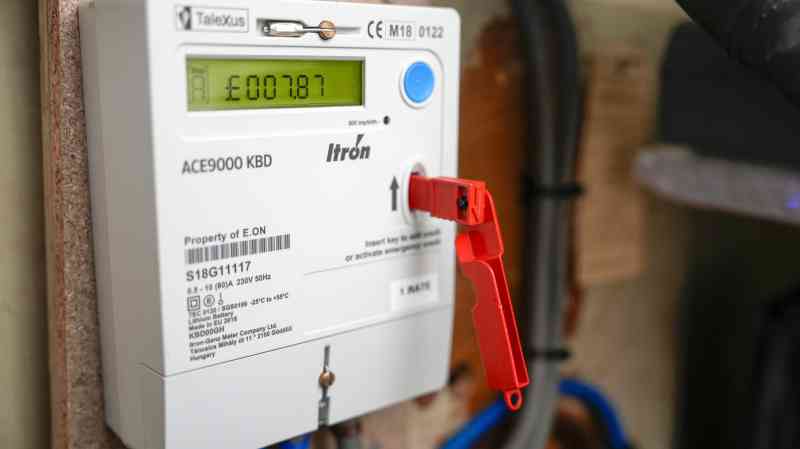Crackdown on prepayment meters: Ofgem ‘must do more to protect vulnerable’
A crackdown on energy firms force-fitting prepayment meters must go further to ensure it protects people with dementia and families with children under five, Citizens Advice has said.
Ofgem, the energy regulator, is consulting charities and campaigners on planned legal changes to make it harder for energy firms to break into customers’ homes. It has been inundated with more than 20,000 responses. Citizens Advice is leading calls for “meaningful changes” to protect vulnerable people.
The regulator’s new rules, which are due to be in place before winter, are the result of a Times investigation which found that British Gas was sending agents to forcibly install pay-as-you-go meters in customers’ homes, even when they were known to have extreme vulnerabilities. People with prepayment meters who cannot afford to top up are cut off from their supply.
Ofgem’s initial proposals for change, announced in April, were for a voluntary code of practice for suppliers, including a ban on force-fitting meters in the homes of people over 85 who lived alone.
But after opening a statutory consultation on the changes last month, the regulator has been warned by thousands of respondents that the proposals must be strengthened.
Citizens Advice, the charity which has worked with Ofgem to develop the rules, released its response to the consultation.
It stated that, to ensure “meaningful changes”, Ofgem should amend the code before it becomes law. In particular, it argued that the ban on forced installations must cover all homes with children under five, anyone suffering from dementia or Alzheimer’s disease, anyone with chronic obstructive pulmonary disease and those with “serious mental and developmental health conditions”.
These changes would protect millions more people from energy firms breaking into their homes and being forced onto prepayment meters.
Citizens Advice said its casework showed that children under five “are enduring significant detriment because of prepayment meters”.
As an example, it shared a case study of a single mother with several children, including a 15-month-old with severe asthma. The heating should be on during the day and two humidifiers should be running to prevent the baby’s asthma symptoms worsening. However, the family’s home is on a prepayment meter so “her children are often left without heat or power”.
The charity’s response stated that the harm to children’s development caused by living in cold homes can range from impacts on educational attainment to severe medical problems. It added: “Citizens Advice strongly believes that no child should face the level of lifelong harm that regular and extended self-disconnection can cause.” It also stated that there should be thorough assessments of all homes with children under the age of 16.
Ofgem said that it had not yet changed its proposals despite advice from three NHS clinicians. Its consultation paper stated that the doctors “argued that children under five should be included” in the ban because young children had an increased risk of breathing problems, such as asthma and bronchitis. Cold homes were also linked to low weight gain in babies, slower growth and development, and higher levels of hospital admissions.
Citizens Advice wrote that Ofgem’s proposals included “significant oversight around the treatment of serious mental and developmental health conditions”, and said those with dementia should be included in the ban.
As an example, it shared a case study of a man with dementia who rang Citizens Advice in October while confused and cold as he was cut off from his energy supply, had no hot water and had been awake for 24 hours.
The charity also said Ofgem should be clearer on the details of its new requirement for suppliers to make ten contact attempts with consumers. It added that the impact of high energy prices and the cost of living crisis meant that “the risks associated with force-fitting a prepayment meter are far more significant” than they were previously.
A campaign group, 38 degrees, helped 20,028 individuals send responses to Ofgem’s consultation. Almost all — 97 per cent — said they believed all under fives should be protected by a full ban and 95 per cent called for a full ban on any forced installations of prepayment meters for anyone.
Christine Davies, from Carmarthen, Wales, wrote in her response: “I live in dread, personally, of having to transfer to a prepayment meter at some point. I am disabled with multiple chronic illnesses and struggle to pay my bills. I am afraid of putting my heating on for too long and for as much as I need it.”
Ellie Gellard, strategic director at 38 Degrees, said: “The public haven’t forgotten last winter’s horrific prepayment scandal, when journalists revealed how energy giants like British Gas were breaking into homes and forcing families onto expensive tariffs, which could leave them cut off without power. It’s time for Ofgem to listen to the public and ban all forced prepayment meter installations, so no-one gets left in the cold next winter.”
Simon Francis, coordinator of the End Fuel Poverty Coalition, said the numbers of respondents “shows the strength of feeling among the general public about the forced prepayment meter scandal,” adding: “The message to Ofgem and the government is clear: The protections proposed do not go far enough and do not protect many of the most vulnerable households.”
Ofgem has had feedback from other campaigners that the ban on forced installations of prepayment meters should include anyone over 75, ten years younger than those covered in their proposed changes.
Ofgem has also been told that those who are currently deemed to be in a slightly lower risk category should include those living a significant distance away from a top-up retailer with no personal transport.
Last year, energy suppliers force-fitted prepayment meters in customers’ homes more than 94,000 times.
The undercover Times investigation found that British Gas had sent agents to force-fit prepayment meters in homes of people with known vulnerabilities. Those targeted included the elderly, customers with severe mental health problems and the mother of a four-week-old baby.
The reports led to investigations by the government, two parliamentary committees and Ofgem. The force-fitting of prepayment meters has been suspended and Lord Justice Edis, one of the country’s most senior judges, has ordered courts to stop listing hearings for energy warrants. The order has not been lifted since and without these warrants the firms cannot force-fit meters.
Firms have also been told they must identify cases where they have wrongfully installed the meters and offer those customers compensation. A company used to oversee the force-fitting of prepayment meters for suppliers has stopped doing the work for them following the Times investigation.
Under Ofgem’s plans for change, those who have meters fitted would be given a £30 emergency credit per meter — but this amount would be added to their debt.
The rules also require representatives of the firms force-fitting meters to wear body cameras or audio recorders, with customers’ permission, so their behaviour can be checked.
When it launched its consultation, Neil Kenward, director for strategy at Ofgem, said: “We are committed to ensuring robust protections are in place for vulnerable customers.”




Post Comment